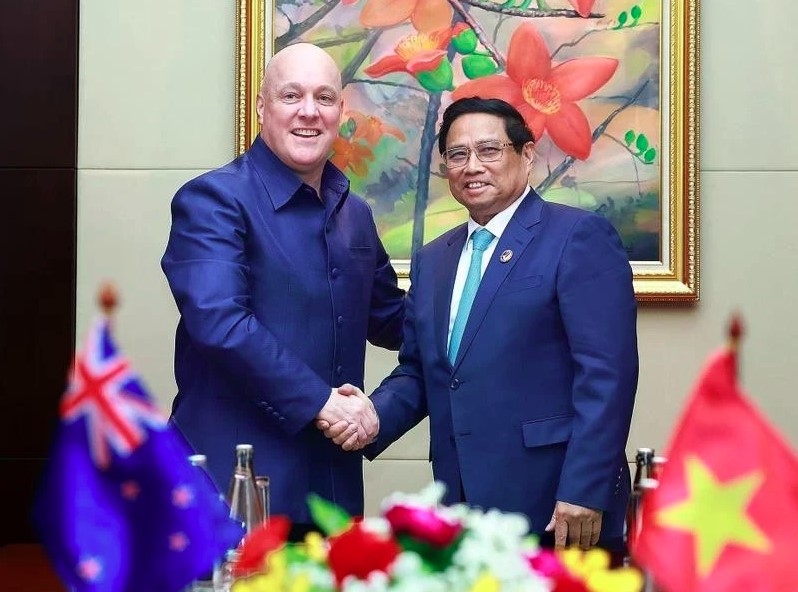New Zealand PM’s visit to benefit relations with Vietnam, ASEAN
New Zealand Prime Minister Christopher Luxon’s upcoming official visit to Vietnam is expected to help reinforce ties between New Zealand and Vietnam in particular and ASEAN in general, New Zealand’s former Ambassador to Vietnam James Kember told the Vietnam News Agency (VNA)'s reporter on the thresholds of the trip.

Kember expressed his eagerness for PM Luxon’s visit, explaining that high-level bilateral visits are a direct and meaningful way to recognise and strengthen the value each side places on the relationship. These visits not only celebrate mutual understanding but also serve to further solidify ties. When such visits are linked to regional meetings, they provide an even more fruitful context for advancing bilateral relations, he said.
Reflecting on the Vietnam-New Zealand partnership, Kember said that the five-year old Strategic Partnership places emphasis on engagement through the Asia-Pacific Economic Cooperation (APEC), the Association of Southeast Asian Nations (ASEAN) and other such fora, defence visits and training, societal and people-to-people ties, development cooperation and strong trade and economic links. Having served as New Zealand's ambassador to Vietnam from 2006 to 2009, Kember said he witnessed the growth of these ties firsthand.
The difference though, he said, is that Vietnam has changed so much since then, with its regular achievement of around 5% GDP growth each year and a growing population. Add to that the political and economic uncertainties both countries face today. Much work has been done to give meaning and strength to the relationship, and for good reason, but potential under current settings has yet to be fully achieved, he asserted.
Kember emphasised that in these uncertain international times, it remains vitally important for countries like New Zealand and Vietnam to understand each other’s positions and to find common ground. Both should find ways to increase the value of their trading and economic links, not least with a worrying return to tariffs and trade barriers, and the interruption of trade flows at the cost to consumers, he added.
The former ambassador noted that New Zealand and Vietnam have established a good dialogue of government and institutional dialogue about international issues affecting both nations back in 2008. A number of the participants from those initial discussions were included in the so-called Track 1.5 talks that took place in New Zealand late last year. This regular dialogue is valued by all as a way of cross-checking the shared points of concern, as well as the points of common view. Overall, it is not so much about finding new areas of cooperation but adding depth – and resource – to the ones the two countries have previously agreed are of high value, he stated.
Kember underlined that in his recent visit to New Zealand, Vietnamese Deputy Minister of Foreign Affairs Do Hung Viet outlined some of the reasons for seeking to upgrade the bilateral relationship and ways in which it might be done. In his speech to the New Zealand Institute of International Affairs in Wellington in early February, Viet placed emphasis on the Asia-Pacific region as the principal engine of growth, as well as underscoring the shared interests and understandings and the warmth of the underpinning personal engagement. Viet made a number of suggestions about ways of collaborating on technical advancement, training programmes for young scholars and strengthening institutional linkages between New Zealand research centres focusing on ASEAN and Vietnamese organisations like the Diplomatic Academy of Vietnam. These are all to be welcomed, Kember said.
Indeed, while there is some value in setting higher and higher bars for cooperation, it is even more important that action speaks louder than the words – and that the two sides do indeed see more, and deeper, exchanges that benefit both countries. Both New Zealand and Vietnam are part of the same Asia-Pacific region, he said, explaining that finding common ground is essential, as is being honest about the reasons for any points of difference.
Commenting on the New Zealand-ASEAN relations and bilateral efforts to promote peace and prosperity, the former ambassador said that New Zealand has long recognised the pivotal role of ASEAN in promoting peace and security in the region. Cooperation in defence, fighting transnational crime, and military education is all rightly situated in an ASEAN-plus context.
At the same time, New Zealand needs to continue working on its relationships with individual members of ASEAN, such as Vietnam. According to Kember, it remains essential to keep up the dialogue of officials and research institutions, the exchange and education of young people, the two countries’ future leaders, to ensure that decisions made unilaterally are based on a sound understanding of the views of other key partners.



